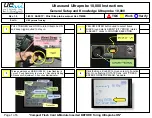
2
GENERAL POWER TOOL
SAFETY WARNINGS
WARNING
Read and understand all instruc-
•
Save these instructions -
This operator's manual
contains important safety and operating instructions.
tions.
Failure to follow all instructions
serious personal injury.
Save all warnings and in-
structions for future reference.
PERSONAL SAFETY
•
•
Do not allow persons unfamiliar with the tool,
these safety instructions, and the tool's opera-
tor's manual to operate the tool.
This tool can be
dangerous in the hands of untrained users.
Do not overreach. Keep proper footing and
balance at all times.
This enables better control
of the tool in unexpected situations.
tool.
WARNING
The device produces visible laser
beams, which are emitted from the
•
•Laser light - Do not stare into beam or view di-
rectly with optical instruments.
Do not point laser
light at others. Laser light can cause eye damage.
LASER SAFETY
This device complies with AS/NZS 60825.1,
Class 2 Laser.
BATTERY USE AND CARE
•
•
CAUTION
Use of controls or adjustments or
performance of procedures other
-
ous radiation exposure.
SPECIFIC SAFETY RULES FOR
LASER LEVELS
Maintain labels and nameplates.
These carry
important information. If unreadable or missing,
contact
MILWAUKEE
®
for a replacement.
•
When
instrument will not be used for a long period, place
it in storage after removing batteries.
ADDITIONAL BATTERY SAFETY RULES
WARNING
WARNING
To reduce the risk of fire, personal
injury, and product damage due to
a short circuit, never immerse your tool, battery
pack or charger in fluid or allow a fluid to flow inside
them. Corrosive or conductive fluids, such as
seawater , certain industrial chemicals, and bleach
or bleach-containing products, etc., can cause a
short circuit.
Do not charge non-rechargeable
batteries.
Do not dispose of tool or batteries with
household waste material!
Tool and batteries
that have reached the end of their life must be
collected separately and returned to an
environmentally compatible recycling facility.
•
manufacturer.
A charger that is suitable for one type
with another battery pack.
battery packs.
Use of any other battery packs may
• When battery pack is not in use, keep it away
•
from other metal objects, like paper clips, coins,
keys, nails, screws or other small metal objects,
that can make a connection from one terminal
to another.
Shorting the battery terminals together
•
•
Under abusive conditions, liquid may be ejected
from the battery; avoid contact. If contact ac-
cidentally occurs, flush with water. If liquid
contacts eyes, additionally seek medical help.
Liquid ejected from the battery may cause irritation
or burns.
Do not use a battery pack or tool that is dam-
explosion or risk of injury.
excessive temperature.
-
perature above 130°C (265°F) may cause explosion.
• Follow all charging instructions and do not charge
the battery pack or tool outside the temperature
Charging
range may damage the battery and increase the risk
•
•
Ensure tool magnets are securely mounted to
a metal surface. Magnet strength may not hold
on thin metal surfaces, causing the tool to fall.
Store your battery and tool in a cool,
dry place.
Do not store battery where temperatures may
exceed 50°C (120°F) such as in direct sunlight, a
vehicle or metal building during the summer.


























